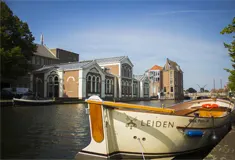

The Netherlands (formerly also known as Holland) was one of the first non-native English speaking countries to offer courses taught in English to international students. The people of the Netherlands have a long standing reputation for being very tolerant and open minded, meaning that you will find yourself in a welcoming and diverse environment.
Sitting in a region of Europe called the Low Countries, the Netherlands is a well developed and diverse country. The country’s location, as well as the sights and locations, make it a very popular destination for both international students and tourists alike.
There is a lot to see and do in the Netherlands, and it has great transport links with its surrounding countries, meaning you will have freedom to travel and sightsee within mainland Europe with relative ease.
There are two types of higher education institutions in the Netherlands: universities of applied sciences (hogescholen; HBO), and research universities (universiteiten; WO). Both universities award globally recognised degree classifications. You can find out more about this on our universities in the Netherlands page.
As a European country, the Netherlands follows the Bologna Process and ECTS, meaning that your qualifications will be recognised throughout the rest of Europe. This is useful if you choose to pursue further studies or for your future career.
Throughout the Netherlands you will find many interesting and welcoming cities. These include the capital Amsterdam, Leiden, Rotterdam, Utrecht and The Hague. Any of these cities would be an excellent choice for you as an international student.
| Continent | Europe |
|---|---|
| Language(s) of tuition | English, Dutch |
| Universities on StudyLink | 44 universities |
| Major Student Cities | Amsterdam (capital), Leiden, The Hague, Rotterdam, Utrecht |
Marketing Management - Digital Business Concepts Bachelor Degree
Fontys Economy Tilburg Netherlands
Find out moreProfessional Master in Data Science, AI & Leadership Professional Master
Amsterdam Tech Netherlands
Find out moreSocial Sciences for a Digital Society Master Degree
Vrije Universiteit Amsterdam Netherlands
Find out morePolicy Economics Master
Erasmus School of Economics, Erasmus University Rotterdam Netherlands
Find out moreCan I study in the Netherlands for free?
Public higher education is government subsidised in the Netherlands, meaning that international students from the EU/EEA pay a fixed fee each year. This fee is normally updated every year, in line with inflation and the general cost of living. If you are from a country outside of the EU/EEA, your tuition fee is not fixed, and universities can charge you more. If you study at a private university, your tuition fees can be higher, regardless of where you are from.
Can I study in the Netherlands as an international student?
The Netherlands has a large international population, and this translates into its student population. As a founding member of many international organisations, the Netherlands is very welcoming to all international students. As an international student, you will likely need to obtain a visa in order to study in the Netherlands. For more information about this, take a look at our Netherlands Student Visas article.
Can I study in the Netherlands with English?
The Netherlands is a country that is very diverse in terms of the languages spoken and understood. Many Dutch universities offer their courses in English as well as Dutch. If your first language is not English, you will need to provide evidence of your language proficiency. Most Dutch universities accept an IELTS or TOEFL certificate.
Applying to university in the Netherlands as an international student is a straightforward process. You can either choose to apply to each university individually, or can use the ‘Studielink’ system, which is centralised and allows you to apply to all the universities you are interested in. You will have to pay an application fee for each university you apply to.
Common admission requirements for universities in the Netherlands include:
You might be required to have any documents translated into Dutch, depending on the university you apply to.
More information about applying for universities in the Netherlands can be found on our Degrees and Masters in the Netherlands pages.
The Netherlands uses the Euro (€) as its currency.
Tuition fees for EU/EEA students at public universities in the Netherlands are subsidised by the Dutch government, meaning that you will pay a fixed fee of €2,530 per year (as of the 2024/25 academic year), which is the same as domestic Dutch students.
If you are from a country outside of the EU/EEA area, then you should expect to pay between €6,000 and €15,000 per year for an undergraduate course, and between €8,000 and €20,000 per year for a postgraduate course. If you choose to go to a private higher education institution, you can expect to pay a higher tuition fee whether you are an EU/EEA or international student.
Your living costs will depend on where you live in the Netherlands. The bigger cities will be more expensive than the smaller cities and towns. On average, you should budget between €500 and €1,500 per month for accommodation, travel, food and other living expenses. Many bars, restaurants and tourist attractions offer student discounts when you show your institution student card. You could also register for an International Student Identity Card (which is valid worldwide) or a CJP/European Youth Card (only valid in the Netherlands).
If you are from an EU/EEA country or Switzerland, you are able to work alongside your studies with no restrictions and without gaining a work permit. If you are from a non-EU/EEA country, your employer must provide you with a work permit. With this work permit, you are able to work for up to 16 hours per week during the academic year, and full-time during the months of June, July and August. For more information about employment for international students, see this Dutch Ministry of Social Affairs and Employment document.
If you do choose to take on some part-time work as an international student, you will also need to have public health insurance. For more information about health insurance and where to find a provider, please visit the Study in Holland Insurance webpage.
International students who wish to study in the Netherlands might be required to obtain a valid student visa. If you are from an EU/EEA country (or Switzerland) you will be exempt from any visa requirements. If you are from any other country, you will need to apply for an MVV or Entry visa, which is a long term visa.
For more information about student visas and how to apply for one as an international student, see our Netherlands Student Visa Guide.
The national language of the Netherlands is Dutch. There are also 3 other co-official languages, and 5 more recognised languages.
It is very common for degrees at Dutch institutions to be offered in both Dutch and English. If you choose to study in a non-native language, you will likely have to provide evidence of your language proficiency. The level of proficiency will be determined by your specific institution, so please contact them for more information. If you do not meet the language requirements, your institution of choice may offer language courses to help you improve.
Even if you are able to study in English, you should still take the opportunity to learn as much Dutch as possible. Communicating with locals and other students is a great way to practise. This is a skill that will make your life in the Netherlands easier, but will also look fantastic on your CV/resume!

Erasmus School of Economics, Rotterdam

Webster Leiden Campus, Leiden

HAS green academy, 's-Hertogenbosch

University of Groningen, Groningen
Join the StudyLink email list and never miss a chance to turn your study abroad dreams into reality!
